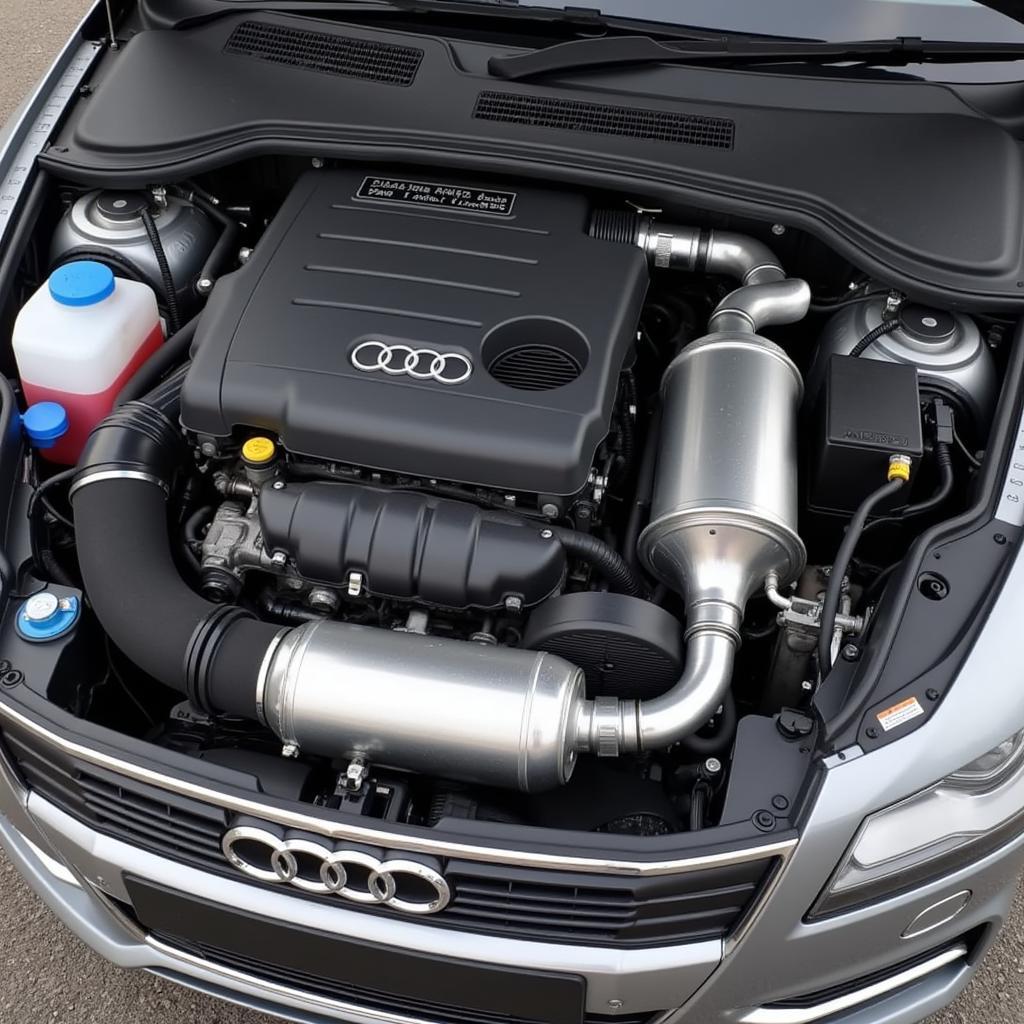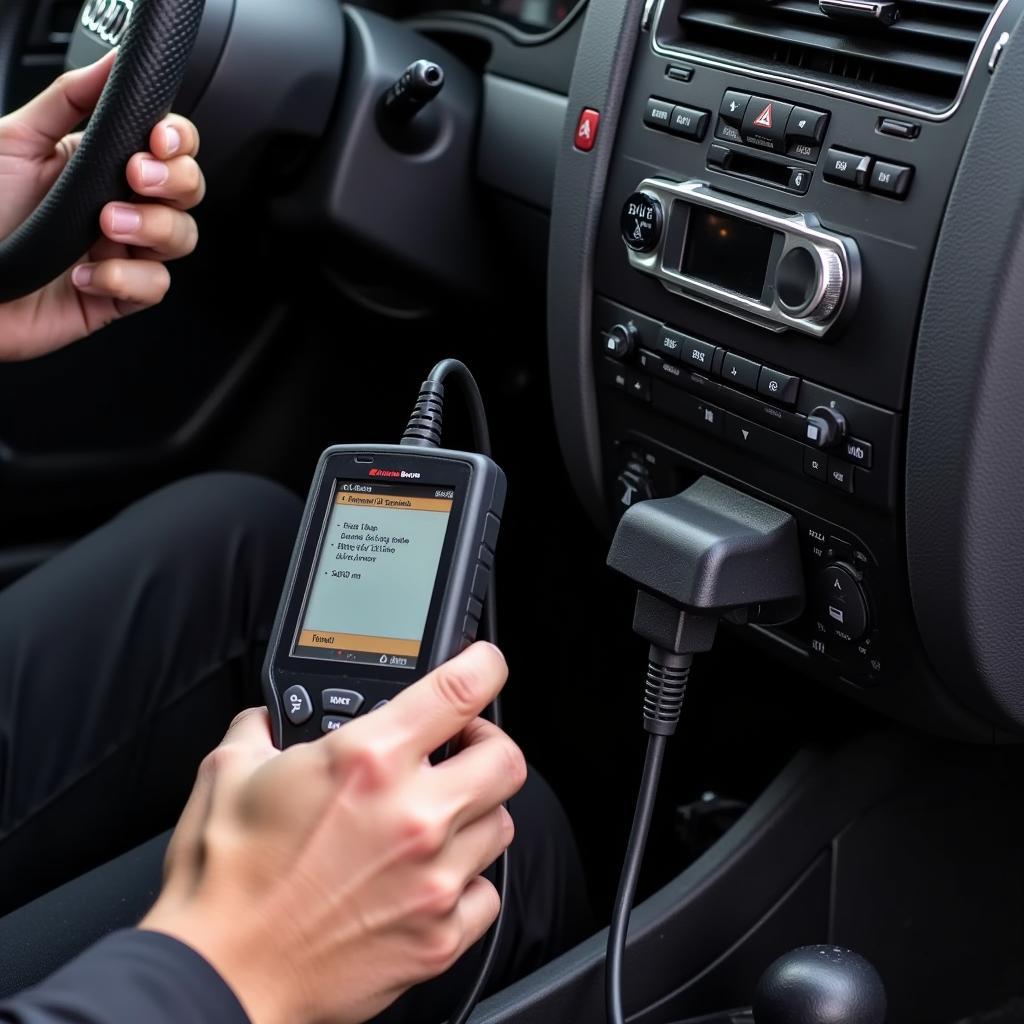Your cart is currently empty!

Decoding the Audi Catalytic Converter Code: A Comprehensive Guide
Dealing with an Audi catalytic converter code can be frustrating. Whether it’s a check engine light glaring at you or a noticeable drop in performance, understanding the causes and solutions is crucial. This guide dives deep into the intricacies of Audi catalytic converter codes, providing owners, mechanics, and technicians with the knowledge to diagnose and address these issues effectively.
If you’re experiencing a “16725 audi fault code”, it’s essential to address it promptly. Catalytic converters play a vital role in reducing harmful emissions, and a faulty one can lead to decreased fuel efficiency, performance issues, and even further damage to your Audi’s exhaust system. Several factors can trigger these codes, ranging from simple sensor malfunctions to more serious problems with the converter itself.
 Audi Catalytic Converter Location
Audi Catalytic Converter Location
One common misconception is that a catalytic converter code always means the converter needs replacing. This isn’t always the case. Issues like faulty oxygen sensors, vacuum leaks, or even a bad fuel mixture can mimic the symptoms of a failing converter and trigger a code. Therefore, accurate diagnostics are crucial before undertaking any repairs. What might seem like a costly catalytic converter replacement could simply be a faulty oxygen sensor, a significantly cheaper fix. Understanding the specific code your Audi is throwing is the first step. For example, the “audi q7 fault code 01583” relates to a specific issue within the emissions system and pinpointing its meaning is essential.
Understanding Audi Catalytic Converter Codes: Causes and Symptoms
A catalytic converter code essentially indicates a problem within the emissions system, often related to the efficiency of the catalytic converter. Several factors can contribute to these codes:
- Faulty Oxygen Sensors: These sensors monitor the exhaust gases before and after the catalytic converter, providing data to the engine control unit (ECU). A malfunctioning sensor can send incorrect readings, triggering a code even if the converter is functioning correctly.
- Vacuum Leaks: Leaks in the intake system can disrupt the air-fuel mixture, leading to incomplete combustion and triggering a catalytic converter code.
- Fuel Mixture Problems: A rich or lean fuel mixture can negatively impact the catalytic converter’s efficiency and set off a code.
- Damaged Catalytic Converter: Physical damage, overheating, or internal failure of the converter itself can trigger a code. This is often the most expensive scenario.
- Exhaust Leaks: Leaks in the exhaust system, especially before the catalytic converter, can interfere with the sensor readings and trigger a code.
 Audi Catalytic Converter Diagnostics
Audi Catalytic Converter Diagnostics
If you encounter a “1999 audi a4 engine code” related to the catalytic converter, proper diagnosis is paramount. Ignoring these codes can lead to further damage and potentially more expensive repairs down the line.
Diagnosing and Fixing Audi Catalytic Converter Codes
Addressing an “audi catalytic converter code” requires a systematic approach:
- Retrieve the Code: Use an OBD-II scanner to retrieve the specific code stored in your Audi’s ECU. This code will pinpoint the specific area of concern.
- Inspect for Leaks: Carefully examine the intake and exhaust systems for any leaks. Even small leaks can significantly affect the emissions system.
- Check Oxygen Sensors: Test the oxygen sensors for proper function. A simple voltage test can determine if the sensors are sending accurate readings.
- Analyze Fuel Mixture: Check the fuel pressure and injector performance to ensure the correct air-fuel mixture.
- Inspect the Catalytic Converter: Visually inspect the converter for any physical damage or signs of overheating. A temperature gun can help determine if the converter is functioning at the correct temperature.
What if the Converter Needs Replacing?
If the diagnosis points to a faulty catalytic converter, replacement is necessary. While aftermarket converters are often cheaper, opting for an OEM Audi catalytic converter is often recommended for optimal performance and longevity.
Experiencing an issue like “audi s5 trouble code p0300” might require specialized knowledge and tools. Consulting with a qualified Audi technician is always a good idea, especially for complex diagnostic and repair procedures.
Conclusion
Addressing an “audi catalytic converter code” doesn’t have to be a daunting task. Understanding the potential causes, symptoms, and diagnostic procedures empowers you to take the right steps. Regular maintenance, prompt attention to warning signs, and accurate diagnostics can save you time and money in the long run. Remember, a well-maintained emissions system not only benefits your Audi’s performance but also contributes to a cleaner environment.
For personalized assistance and expert advice regarding your Audi’s catalytic converter codes, contact us at +1 (641) 206-8880 and our email address: vcdstool@gmail.com. Our office is located at 6719 W 70th Ave, Arvada, CO 80003, USA. We are here to help you navigate through any automotive challenges you may encounter.
If you’re looking for information on “2013 audi fault code p20ee”, we have resources available to assist you.
FAQ
- What is a catalytic converter? A catalytic converter is a component in the exhaust system that converts harmful pollutants into less harmful substances.
- How long does a catalytic converter last? Typically, a catalytic converter should last for the lifespan of the vehicle, but various factors can influence its longevity.
- Can I drive my Audi with a catalytic converter code? While you can technically drive, it’s not recommended. Ignoring the code can lead to further damage.
- Are aftermarket catalytic converters a good option? While they are less expensive, OEM converters are generally recommended for optimal performance.
- How can I prevent catalytic converter problems? Regular maintenance, including using the correct fuel and avoiding harsh driving conditions, can help prevent issues.
- What are the symptoms of a failing catalytic converter? Symptoms can include decreased fuel efficiency, loss of power, a rattling noise from the exhaust, and the illumination of the check engine light.
- What does the check engine light mean in relation to the catalytic converter? It signifies a problem within the emissions system, often related to the catalytic converter’s efficiency.
by
Tags:
Leave a Reply